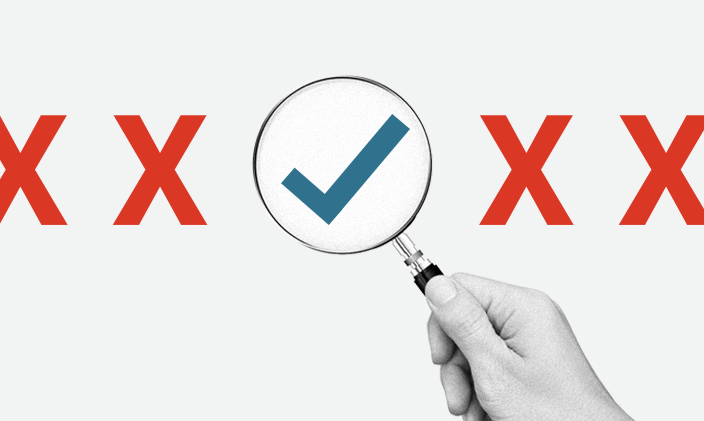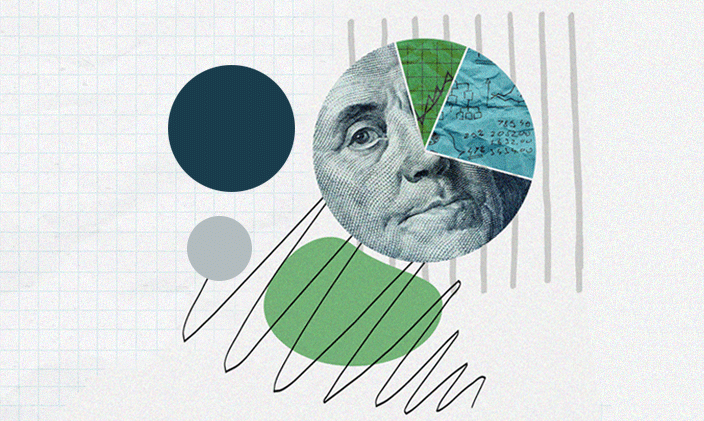What you can do with a finance degree
At a glance
- Finance jobs require graduates to have an understanding of economic principles, mathematics, investing and more.
- While finance and accounting degrees are different career paths, they both can help prepare graduates with the skills necessary for jobs in the financial field.
- Finance jobs include accountant, financial advisor, auditor and tax examiner.
- University of Phoenix can help prepare graduates to pursue finance jobs like accountant with a Bachelor of Science in Accounting degree or financial planner with a Bachelor of Science in Business with a Financial Planning Certificate. Learn more
A degree in a financial field, such as financial planning or accounting, can help you prepare to seek employment in a range of business and financial careers. According to U.S. Bureau of Labor Statistics (BLS) estimates from September 2022, these sectors are projected to experience a 7% expansion between 2021 and 2031. The projections also suggest a potential for 980,200 job openings per year.
The diverse range of high-paying opportunities in financial industries includes positions in financial analysis, business intelligence, insurance underwriting, procurement and account management. A finance degree helps you develop a knowledge base, through education and on-the-job training, to pursue entry, mid-level, and senior-level positions in many of these specialties.
Finance degrees are different from accounting degrees, which concentrate on the technical aspects of auditing and financial reporting. Undergraduate finance students learn financial analysis, budgeting, forecasting, risk management, investing and business-related problem-solving skills.
Here’s a closer look at the components of a finance degree program, the skills students learn and the careers potentially available upon graduation.
BLS Occupational Employment Projections, 2021-2031 is published by the U.S. Bureau of Labor Statistics. This data reflects BLS’ projections of national (not local) conditions. These data points are not specific to University of Phoenix students or graduates.
Start your business career on the right foot. Explore business degrees at University of Phoenix!
What is a finance degree?
Finance degree programs cover a range of business and money-related topics with the goal of providing a solid knowledge base on which to grow a career in business, investment or a related field.
Students learn about credit, debt, financial analysis, investment decisions and concepts used in banking and capital management. Programs also cover economics, the principles of risk management and the basics of budgeting.
Finance is a required component in most business bachelor’s degrees. Business programs could be an alternative to finance for those seeking to learn more about administrative or management concepts.
What skills do you need to pursue a career in finance?
The skills necessary for a career in finance vary by industry and specialty. However, specific technical and soft skills you learn during a degree or certificate program will help in any finance job.
BLS lists similar in-demand skill requirements for finance degree jobs like financial analyst, financial advisor and budget analyst.
- Analytical skills are essential to every finance career because of the need to evaluate profit potential, risks, performance and other factors during the decision-making process.
- Math abilities are vital for translating financial data and accounting reports into useful insights. This skill often requires knowledge of analytics or accounting software.
- Decision-making skills are necessary because the choices you make in any finance-related career will affect your client’s or employer’s bottom line and poor decisions could lead to financial losses.
- An understanding of economic principles is necessary to comprehend the financial environment in which your company or client operates.
- Knowledge of financial markets and investment instruments is necessary for many finance careers. Even in non-investment banking careers, company shares, debt instruments and the impact of stock markets on your employer’s profit potential can be vital for your job.
- Accounting and budgeting specialists handle bookkeeping and reporting in most corporations. However, all finance professionals need a grasp of these fundamentals to provide a framework for many of their tasks.
Today’s finance industry uses analytics, market analysis and forecasting software. Employers will expect their workers to be familiar with these tools.
Requirements and degrees for a career in finance
Most finance careers require a college degree or equivalent experience. The subject of the degree can be important in some fields and less vital in others. For example, BLS says that firms hiring personal financial advisors do not always specify a field of study, even though they require a bachelor’s degree. On the other hand, financial analysts usually need a degree in business, while a finance degree would also be relevant.
Bachelor’s degree
Finance professionals make decisions and perform analyses that can affect a company’s or client’s financial future. Many employers prefer job candidates with a bachelor’s degree in business or a related field to ensure that they have the knowledge base to handle this responsibility. Degrees in finance, accounting, math, statistics or data science could also help you earn the qualifications for a job in the financial sector.
Entry-level finance jobs typically require a bachelor’s degree. Depending on the specific industry you enter, qualifications for finance professionals may vary greatly. With a large range of entry-level finance careers comes equally diverse opportunities for people with specialized degrees, experience, and even niche interests and goals within business and finance.
Degrees in business and financial fields can provide fundamental knowledge and skills that support your daily job responsibilities in finance.
It’s important to familiarize yourself with the general requirements and day-to-day responsibilities of any role you’re interested in pursuing in finance, both before beginning any business finance degree program and after completing your degree, as requirements may change over time. This way, you can specialize in a path you’re interested in, or even consider seeking a broader education that may qualify you for more than one potential career route.
Professional certifications and online courses
For many finance careers, earning a professional certification or taking continuing education classes is an excellent way to qualify for a finance specialization.
For example, you can become a Certified Financial Planner (CFP) if you would like to work as a financial advisor or planner for individuals or companies. Another option is to become a Chartered Financial Analyst (CFA), which is a popular requirement for any financial advisor and analyst position involving investment decisions. It’s important to note that UOPX does not prepare students for these exams.
It’s also possible to add specific certificates to a degree program. For instance, you might try to earn a financial planning certificate while studying for a business or financial bachelor’s degree. If you need specific skills for your career plans, you can take individual classes online.
7 career paths you can pursue with a finance-related degree
While most people may only think of careers like accounting, bookkeeping, banking and other general roles within the industry, there are various job opportunities for those interested in working within the finance field or related niches.
Finance jobs range from entry-level to more specialized roles and may require a variety of skills or professional certifications to qualify. As such, understanding all the possibilities, requirements and skills to be successful in each is an important first step to planning a career in business finance, especially when considering the rate of employment after graduation.
Here are seven careers you can pursue with a finance-related degree.
1. Accountant
Accountants oversee financial information for a business or other establishment. This role includes tracking income and spending, researching ways to improve tax returns, and identifying potential areas of overspending. BLS states that accountants typically need a bachelor’s degree in accounting or a related field, like business or finance, to enter the field.
BLS states that accountants and auditors had an annual wage range between $47,970 and $128,970 in May 2021. This industry is projected to grow at a rate of about 6% between 2021 and 2031, which is in line with the average growth for all industries in the U.S.
Salary ranges are not specific to students or graduates of University of Phoenix. Actual outcomes vary based on multiple factors, including prior work experience, geographic location and other factors specific to the individual. University of Phoenix does not guarantee employment, salary level or career advancement. BLS data is geographically based. Information for a specific state/city can be researched on the BLS website.
BLS Occupational Employment Projections, 2021-2031 is published by the U.S. Bureau of Labor Statistics. This data reflects BLS’ projections of national (not local) conditions. These data points are not specific to University of Phoenix students or graduates.
2. Tax examiner
Myriad roles fall within tax-related occupations. Many align to similar requirements and job descriptions as accountants, while others are specific to tax laws and collections. Tax examiners, specifically, work with small businesses and individuals to conduct audits, review tax returns and ensure that these groups pay their appropriate amount of taxes. Tax examiners can work for different levels of government but typically collect the taxes of individuals.
According to BLS, tax examiners typically need a bachelor’s degree in accounting or a related field, like business. In May 2021, these professionals made between $35,260 and $102,840. BLS projects employment for tax examiners will decline by 7% between 2021 and 2031. Still, about 4,300 job openings each year are predicted.
3. Financial analyst
Financial analysts can fill several positions within companies, banks, investment firms and other corporations that need detailed eyes on their finances. These employees assess the financial performance of an organization, such as investment and stock performance, to determine its value and make recommendations.
According to BLS, a comparable job title to “financial analyst” is “financial manager.” As of May 2021, financial analysts reportedly earned an annual wage between $57, 900 and $166,560, and generally, a bachelor’s degree is needed for entry-level roles. These roles are projected to grow by 9% between 2021 and 2031, which is roughly 32,000 openings a year.
4. Auditor
An auditor is like an accountant, sharing many of the same responsibilities and skills, except rather than preparing financial statements for an individual or corporation, auditors are responsible for verifying the accuracy of such statements. There are two primary types of auditors: internal and external. Internal auditors are employed by the organization they are auditing, while external auditors are employed by an outside organization. Similar to accountants, auditors typically need at least a bachelor’s degree in accounting or an education in a related field.
As of May 2021, auditors earned an annual salary between $47,970 and $128,970, according to BLS. Employment for this profession is projected to grow by 6% between 2021 and 2031. That translates to an estimated 136,400 openings each year.
5. Financial manager
Maintaining the financial health of an organization is the key responsibility of a financial manager. These professionals often create financial reports, forecasts and budget plans to maximize profits. Because of the high level of responsibility in this role, financial managers typically need a bachelor’s degree and at least five years of experience in a similar profession, such as accounting or financial analysis, according to BLS.
As of May 2021, financial managers earned between $77,040 and $208,000, according to BLS. Jobs are projected to grow by 17% between 2021 and 2031, or 71,300 jobs annually, according to BLS.
6. Financial advisor
Financial advisors, like tax examiners, can work with individuals or organizations and are responsible for making recommendations or providing advice on financial investments, such as retirement planning, tax laws, insurance and more. Sometimes referred to as financial planners, these professionals can support a wide range of topics or specialize in areas like insurance and risk management, investment, and estate planning.
According to BLS, a bachelor’s degree is typically required, and certain professional certifications or a master’s degree can enhance a financial advisor’s reputation and ability to become a manager. As of May 2021, financial advisors earned between $47,570 and $208,000, according to BLS. Employment is projected to grow by 15% from 2021-2031, or an estimated 30,500 open roles each year.
7. Financial planner
Financial planners provide advice for individuals. Unlike personal financial advisors, they also often work with businesses, corporations and organizations. In addition to capital management, you can offer insights about other investments, taxes, budgeting, insurance coverage and savings.
Business students can earn a certificate in financial planning to specialize in this area. The BLS does not make a distinction between personal financial advisors and planners, so the estimated salary range was $47,570 to $208,000 in May 2021.
Learning about finance at University of Phoenix
Develop skills to prepare to pursue a finance career with a degree or certificate in accounting or financial planning from UOPX. UOPX’s degree programs and certificate offerings are rigorous but have flexibility as an online program.
Learn more about our financial planning and accounting offerings. Students can earn a stand-alone degree or a certificate or combine a certificate with a business degree, like a Bachelor of Science in Business or an MBA. UOPX programs include:
- Bachelor of Science in Accounting
- Bachelor of Science in Business with a Financial Planning Certificate
- Undergrad Financial Planning Certificate
- Graduate Accounting Certificate
To learn more about the finance program or our educational offerings, how to save money on your education and how UOPX helps make college fit your busy life, visit the University of Phoenix website.

ABOUT THE AUTHOR
Michael Feder is a content marketing specialist at University of Phoenix, where he researches and writes on a variety of topics, ranging from healthcare to IT. He is a graduate of the Johns Hopkins University Writing Seminars program and a New Jersey native!
want to read more like this?





